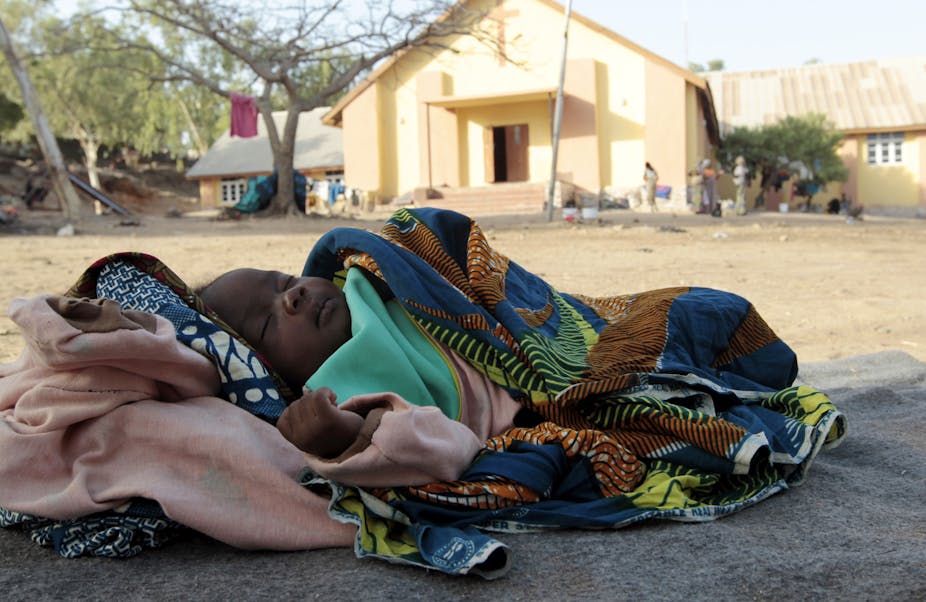The internal displacement of people has become a significant concern in Nigeria. More than two million people have fled their homes because of the Boko Haram insurgency in the northeast. Millions more have been displaced by other causes, including natural disasters and development projects.
The rise in the problem has led to calls for concrete rights-based solutions to protect and assist internally displaced persons. This is why the absence of a national legal framework for dealing with the crisis is receiving increased attention.
The problem of internal displacement is serious enough to require amendments to Nigeria’s constitution. The rising wave of displacements in the north has far-reaching implications for national political stability. Given that the constitution obliges the government to safeguard the welfare of all Nigerians, it becomes imperative that there be constitutional protection for displaced people.
There are existing trends for this argument. The Ethiopian constitution recognises the right of pastoralists not to be displaced. It further requires that displaced persons must be protected. The Colombian Constitutional Court in 2004 declared the situation of internal displacement in the country an “unconstitutional state of affairs”. This is despite the Colombian constitution not having such explicit provision.
The possible legal routes
Nigeria is party to the African Union Convention for the Protection and Assistance of Internally Displaced Persons (Kampala Convention). Increased attention is therefore being put on the need for it to align its national legal system with the convention.
But so far the discourse on a national instrument for addressing the plight of displaced people has ignored the role played by the Nigerian constitution. The constitution is significant in that, among other things, it sets policy objectives for the state and makes provision for fundamental human rights.
In the national hierarchy of norms, the constitution is regarded as the supreme law. Its essence, set out in the preamble, is the need to ensure the welfare of the Nigerian people.
In fostering this objective, the constitution highlights strategic policy areas that the government must give priority to. It further provides for fundamental human rights that must be respected, and for which redress may be sought if they are infringed.
One might argue that a reason for the omission of the role of the constitution in the protection of internally displaced persons lies in the rigidity of constitutional amendments. But recent history has shown that it is possible to amend the Nigerian constitution if necessary.
There are arguably two reasons to follow this route.
The case for constitutional protection
A constitutional entrenchment of protection will elevate the discussion on internal displacement from being just an altruistic, humanitarian concern to a constitutional issue. It will thus necessitate a systemic institutional response.
As the constitution is the epicentre for the formation and functioning of government, including protection for internally displaced persons, its provisions will serve as a strong basis for the various organs of state to act proactively.

A constitutional entrenchment will further grant people a legitimate claim to protection against arbitrary state decisions that result in their displacement without recourse to international standards.
This is particularly relevant when people are forced to leave their homes to make way for development projects. Constitutional protection will give displaced people the opportunity to assert their rights to adequate protection against impoverishment from disruptions to their livelihoods.
But how should the constitutional protection be entrenched?
Two models are proposed. The first is an insertion of a clause in chapter II of the 1999 constitution. The second is an insertion of a specific right under chapter IV.
Safeguarding displaced people
Chapter II of the constitution (sections 13 to 24) provides for the Fundamental Objectives and Directive Principles of State Policy. The directive principles set out strategic policy direction for the state in the realisation of a democratic, just and egalitarian society.
The directive principles outline policy priorities in relation to economic, political, social and environmental concerns. In preserving social order, section 17 of the 1999 constitution mandates the state to direct its policy towards all citizens. In addition, it specifically recognises the need to protect children, young people and the elderly.
To this end, the state has developed national policies on children and young people. In 2001, a National Youth Policy was developed. The policy was revised in 2009. The aim of the policy was to enhance youth participation and foster youth development. In 2007, Nigeria developed a National Child Policy to promote engagement among stakeholders on child rights.
But a downside to entrenching protection for internally displaced persons in the directive principles is that its provisions are non-justiciable. As such, they cannot be legally asserted in a court of law. To circumvent this, an alternative proposition is to insert a specific right for protection of internally displaced persons under chapter IV of the constitution.
Chapter IV of the constitution (sections 33 to 46) provides for fundamental human rights. As rights contained in this chapter are enforceable, an insertion of a specific right will afford internally displaced persons a legitimate claim before national courts.
A sample provision that could be incorporated in this chapter is:
every person shall have a right to be protected and assisted in situations of internal displacement.
Clarification on what protection and assistance entails in the various circumstances of internal displacement could be advanced by the judiciary. In advancing clarification, the judiciary should make reference to the United Nations Guiding Principles on Internal Displacement and the Kampala Convention, which Nigeria has ratified.
The way forward
In January 2016 the Nigerian National Assembly set up a constitutional review committee at the level of the Senate and the House of Representatives.
Having voiced a commitment to protect and assist internally displaced persons, the National Assembly is in a position to initiate constitutional amendments to incorporate their protection. This would ensure durable solutions to the problem of internal displacement at all levels of government. It will also serve as a basis to test the constitutionality of governmental actions, policies, interventions and laws on internal displacement.

